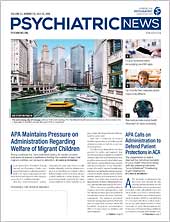What do medical students, residents, and other trainees need to know about psychiatry? I have been pondering these questions for nearly three decades. New knowledge is coming at such a rapid pace on neurobiology, medication, and psychotherapy that it is not an easy question to answer. Yet, what informs my view is what I see every day in my job as a staff psychiatrist at the University of Iowa Hospitals and Clinics and in my role as program director.
In my view, the first task for any beginning student or resident is learning to conduct the patient interview, as described in Pocket Guide to Psychiatric Practice. Everything else we do for (and with) the patient is informed by a thorough assessment that includes a psychiatric and medical history, developmental history, information about social and personal life, and so on (see sidebar).
An important (and some would argue essential) element of the assessment is the mental status exam. The mental status exam has three major goals: (1) setting the stage to formulate an impression of the patient’s diagnosis or differential diagnosis and to begin to generate a treatment plan, (2) producing a document that contains information organized in a standard, readable, and easily interpretable way, and (3) helping the clinician establish a therapeutic relationship with the patient and, in the process, reassuring him or her that help will be provided.
Readers receive detailed instructions on how to conduct the patient interview:
•
Establish rapport early in the interview.
•
Determine the chief complaint.
•
Use the chief complaint to develop a provisional differential diagnosis.
•
Rule out or in the various diagnostic possibilities by using more focused and detailed questions.
•
Follow up vague or obscure replies with enough persistence to determine the accurate answer to the question.
•
Let the patient talk freely enough to observe how tightly his or her thoughts are connected.
•
Use a mixture of open and closed questions.
•
Do not be afraid to ask about topics that you or the patient might find difficult or embarrassing.
•
Do not forget to ask about suicidal thoughts.
•
Give the patient a chance to ask questions at the end.
•
Conclude the initial interview by conveying a sense of confidence and, if possible, hope.
Readers are also provided with sample questions that may help them understand how to ask about sensitive issues. Examples:
Thought Broadcasting/Audible Thoughts
The patient believes that his or her thoughts are broadcast so that he or she or others can hear them. Sometimes the patient believes that his or her thoughts are picked up by a microphone and broadcast on the radio or television or through the Internet.
•
Have you heard your own thoughts out loud, as if they were a voice outside your head?
•
Have you felt that your thoughts were broadcast so that other people could hear them?
Auditory Hallucinations
Auditory hallucinations typically involve hearing voices speaking to the patient or calling his or her name. The voices can be male or female, familiar or unfamiliar, or critical or complimentary. Hallucinations involving sounds other than voices are less characteristic.
•
Have you heard voices or other sounds when no one was around or when you could not account for them?
Euphoric Mood
The patient has had one or more distinct periods of euphoric, irritable, or expansive mood not caused by alcohol or drug intoxication.
•
Have you been feeling too good or even high—clearly different from your normal self?
•
Have you felt irritable and easily annoyed?
Dysphoric Mood
The patient feels sad, despondent, discouraged, or unhappy. Significant anxiety or tense irritability also should be rated as a dysphoric mood.
•
Have you been having periods of feeling depressed, sad, or hopeless? When you didn’t care about anything or couldn’t enjoy anything?
•
Have you felt tense, anxious, or irritable?
Assessment is just the beginning of the psychiatric journey. From there, readers are encouraged to explore the clinical chapters, read about the many important—and fascinating—disorders, and learn the fundamentals of their clinical management. Because psychiatry is the most human of the medical specialties, all learners—regardless of what they do in the future—should be able to define and recognize mental illnesses and identify methods for treating them. ■

